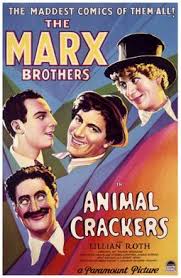
ANIMAL CRACKERS
US, 1930, 97 minutes, Black-and-white.
Groucho Marx, Harpo Marx, Chico Marx, Zeppo Marx, Margaret Dumont, Lillian Roth, Louis Solrin.
Directed by Victor Heerman.
The Marx Brothers were very successful on the American stage, their comedy routines. In the late 20s, they had been appearing on Broadway in animal crackers, by celebrated playwright, George S.Kaufmann songs by the celebrated Harry Ruby and Bert Kalmar. The first screen appearance was short film followed by a film version of the estate success, The Coconuts.
Animal Crackers is their second film, adaptation of the play, elimination of most of the songs. They Were Then to Make Several Films at Paramount Including Monkey Business, Horse Feathers, Duck Soup. Then the very successful transition to MGM, bigger budget production values, and the consolidation of their screen success: A Night at the Opera, A Day at the Races, At the Circus, Go West, The Big Store.
The reason for seeing Animal Crackers is because of its historic place in the Marx Brothers career. However, it is an opportunity to enjoy the screen beginnings of their popular routines. There is a threat of a plot, a hostess welcoming African explorer Captain Spaulding to her home, the unveiling of a celebrated art work, shenanigans about substituting the painting for the boyfriend of the hostess’s daughter. But, the plot is not important.
Groucho Marx had perfected his look and style, his patter, his walk slouch, his eyebrow raising, his quick wit, going off at different angles, play on words, touch of innuendo, interruptions, absolute self-confidence. And he was to do this for the next 40 years in film and television.
Chico Marx was successful at comedy routines, the touch of being ingenuous. However, he was celebrated for his virtuosity and piano playing, transition from classical style to modern style, and the comic play of his fingers along with the great skills. There is ample opportunity to admire this here.
Harpo, not speaking, grinning with and insinuating look, this time a skirt chaser, all kinds of visual gags. It is rather a surprise, but a pleasure, when he does eventually, and out of character, play the harp.
There is also Zeppo, here a secretary, who has a dictation scene with Groucho, but who did not have the screen impact of his brothers, taking on more serious roles and then withdrawing from films and focusing on the business side of the family.
For fans of the later Marx Brothers films, this early film should not be missed.